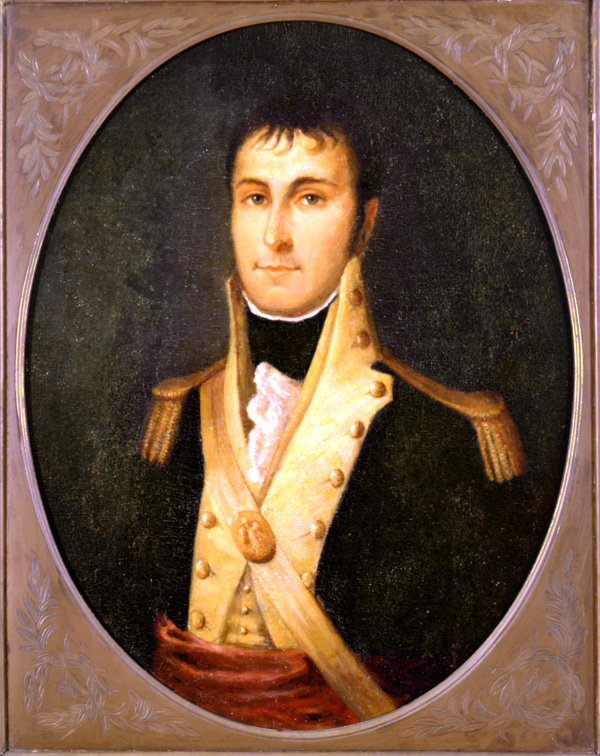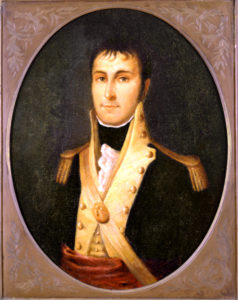William Charles Cole Claiborne
William Charles Cole Claiborne was the first territorial and state governor of Louisiana in its transitional years from the Louisiana Purchase of 1803 to statehood in 1812.

Courtesy of Louisiana State Museum
William C. C. Claiborne. Savary, E.B. (Artist)
Tilliam Charles Cole Claiborne was the first territorial and state governor of Louisiana, presiding over the region in its transitional years of Americanization from the Louisiana Purchase of 1803 to statehood in 1812. His life reflected the ambitious growth and direction of the United States in the first generation following the ratification of the US Constitution. Born in Virginia to a colonel in the American Revolution, Claiborne was well educated and attended William and Mary College. Reared with the example of service to the republic, Claiborne took up his first post at age fifteen in the clerk’s office of the US Congress in New York City and later in Philadelphia. He returned briefly to Virginia, where he passed his bar examination.
Seeking opportunities in the West, Claiborne migrated to Tennessee, where he established a successful law practice. In 1796 he took part in the convention that ratified Tennessee’s constitution and was appointed to the bench of the new state’s supreme court. In 1797 he was elected to fill the Tennessee seat in the US House of Representatives vacated by Andrew Jackson and was elected to a full term a year later. Claiborne’s vote was crucial when the House determined the winner of the 1801 presidential election between Thomas Jefferson and Aaron Burr.
First American Governor of Louisiana
Jefferson ultimately rewarded Claiborne by appointing him governor and Indian affairs commissioner for the Mississippi Territory. These roles would not be his final assignments under the Jefferson administration, however. In 1803 Claiborne and Maj. Gen. James Wilkinson were commissioned to take possession of the Louisiana Purchase from France. The following year, Claiborne’s scope was narrowed with his appointment as governor of Orleans, a territory that initially comprised all of what became the state of Louisiana but without the parishes west of the Perdido River; they were added to the territory five years later. But Claiborne had not been Jefferson’s first choice: Jackson had petitioned Jefferson for the job, but the president offered the post to James Madison and the Marquis de Lafayette, both of whom declined. Jefferson thought Lafayette an ideal choice given the Revolutionary War hero’s good standing with both the French colonists of Louisiana and the Americans. In spite of his initial hesitation, Jefferson was impressed by reports of Claiborne’s service and told his cabinet that his appointee’s “conduct has on the whole been so prudent and conciliatory that no secondary character would have a better right” to the position.
Claiborne’s chief concern as governor was to incorporate the former French and Spanish colony into the United States, bring its institutions in line with those of the republic, and mitigate conflict between the Creoles and the influx of American settlers. In one of his first reports to Jefferson, Claiborne wrote that he found the people of Louisiana to be “uninformed, indolent, luxurious—in a word illy [sic] fit to be useful citizens of the Republic.” Although he was initially distrusted by the Creoles, Claiborne became a placatory figure and played a judicious role in many small matters, including the return of Roman Catholic Church property seized by the Napoleonic regime. He also improved his standing by welcoming French refugees from the slave revolt in Saint-Domingue (Haiti). Some of Claiborne’s most vocal opponents were recent US immigrants, who accused him of moving too slowly toward statehood. In 1807 he fought a duel with one of their leaders, Daniel Clark, who inflicted a severe wound upon the governor.
Slave Uprisings and Foreign Threats
The specter of a slave rebellion inspired by events in Saint-Domingue troubled Creoles and American settlers alike. Finding relations between the races in Louisiana to be lax in comparison to slaveholding states, Claiborne tightened the Code Noir, the French colonial laws that regulated interactions between white and black people, and he strengthened the militia. The anticipated uprising finally erupted in 1811, when over five hundred enslaved people in St. John the Baptist Parish revolted against their masters. Claiborne put down the rebellion with swift force and executed its leaders. It was the largest slave revolt in the United States to date and the last such uprising in Louisiana.
Shortly after Louisiana’s admission to the Union on April 30, 1812, Claiborne was elected as the state’s first governor in a two-tier system that involved balloting by the state’s male property owners, followed by a vote in the legislature. Although his opponent Jacques Villere was Creole, Claiborne was assured victory from the substantial support he enjoyed among the French population.
With the outbreak of the War of 1812, Claiborne raised militia companies and negotiated the aid of the pirate Jean Lafitte to defend New Orleans from British attack in 1815. The federal commander, Maj. Gen. Andrew Jackson, doubted the loyalty of New Orleans and imposed martial law in a battle of wills with Claiborne. After the British defeat in 1815, Claiborne wrote, “Among the blessings which the news of Peace have brought to the Inhabitants of this city is a restoration of their constitutional rights.”
In 1817 Claiborne was elected to serve in the US Senate but died of a liver ailment before he could take his seat. Little is known about his personal life aside from the death of his first two wives, Eliza Lewis and Clarissa Duralde. He was survived by his third wife, Suzette Bosque. Claiborne was a skillful politician with a keen understanding of local conditions. He married into the Creole elite and was widely praised for his role in bringing republican institutions to Louisiana and for successfully incorporating the territory into the United States.
